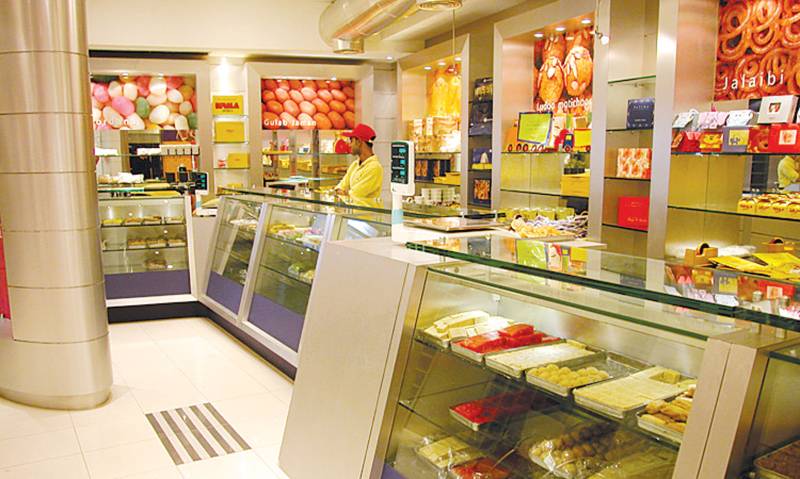LAHORE - The story of Nirala Sweets is akin to a Shakespearean tragedy of sorts - where fame, money and success simply disappeared overnight.
What was once the great ‘Taj’ of local sweets, without a single real competitor in sight, dismantled in a matter of days. But what happened to the great Nirala empire?
In 2006, Nirala Sweets, the confectionary chain based in Lahore, had a whopping 39 branches countrywide, including one each in Dubai and Sharjah. Apart from producing and selling traditional sweets, Nirala also had its own branded snacks, dairy products and beverages.
Nirala was founded in 1948 by a man called Taj Din who was originally a seller of woollen shawls in Indian-held Kashmir. When he migrated to Lahore after partition, he realised that the winter in the city was too short and he needed to find something else to do. The businessman observed that the city loved to eat. And everybody seemed to have a sweet tooth.
His first shop thus opened as a breakfast joint on Fleming Road with special recipes of “rabri,” halwa poori and just a few items of the traditional “mithai,” which made great waves in Lahore. Soon people were travelling great distances to eat at his tiny joint, and it was clear that the model was a success.
Eventually, Taj Din’s eldest son Farooq Ahmad joined him, and the mithai took the whole city by storm. Inspired by the famous pastry shops of Paris, Farooq Ahmad travelled the world, developing new techniques and improvising recipes.
Soon enough, Nirala under Farooq Ahmed gained a reputation for fine sweets, entrepreneurship and also great charity. Working with hot oil day after day, the workers at Nirala often suffered from burns standing over the stove. At this time, Taj Din was able to acquire the recipe for a special burn cream from a “hakim” in Lahore’s inner city. Instead of limiting it to his workers, he began to distribute it for free, to anybody who required it.
“Nirala continued to give us this free ointment having no match in terms of efficacy to people for years. “Unfortunately, this practice has also ended with the demise of the sweets”, said Muhammad Arshad Awan, a tailor at Hameed Nizami Road who personally witnessed people treated for burn injuries.
In the late 80s, Farooq Ahmad was diagnosed with Parkinson’s, and his eldest son, young and energetic Faisal Farooq took over the reins at just 20 years of age.
When his health deteriorated, nervous shareholders sold off their stakes and the company ultimately belonged solely to Farooq Ahmed. Under the new, young leadership, Nirala thrived.
The downfall of the empire began with a bank loan taken to set up a dairy factory. Faisal Farooq mortgaged all his property, worth billions of rupees at the time, including a spacious house in the posh locality of Shadman. What seemed like a good idea at the time, ended in disaster.
“A big initiative at the wrong time triggered the downfall of the confectionery chain,” said Shahbaz Ahmed, who previously served at Nirala Sweets as a manager and saw the expansion of outlets all over Pakistan and in the United Arab Emirates.
“The company started work on establishing a dairy factory at Tandlianwala on the Faisalabad-Okara Road in 2004,” he continued. “In different phases, the company borrowed more than Rs1.5 billion at high-interest rates from the Bank of Punjab when the dairy business was on the decline. The failure of the mega project was a blow for Nirala. It could not pay back the borrowed money and the interest kept piling on,” he said.
“About a hundred kanals of land on Multan Road, shops on Jail Road, Hafeez Centre, Moon Market, factories on Waris Road and many other properties were pledged against the bank loan. The value of the pledged property was far more than the actual amount and interest,” he added.
At this time, the death of a young boy in a road accident added to Faisal Farooq’s troubles.
“After spending ten days behind bars, in 2009, Faisal Farooq settled the issue with the aggrieved family. He remained under stress for years, causing serious digressions and people continued to leave him,” said Shahbaz Ahmed.
“The year 2014 was virtually the end of the great empire, and the factory on Waris Road was sealed for not paying outstanding taxes,” he said.
Faisal Farooq’s name was put on the exit control list (ECL). He was out of the country at the time and did not return. The man who used to keep the company of the country’s top political and business elite became an absconder.
Moreover, he is alleged to be the person who initiated the process of dividing the property among the heirs of the late Taj Din. Both his uncles, Mohammad Mahmood and Mohammad Maqsood, were disassociated from the business after he gave them their shares.
Farooq Ahmad, who once reigned the business world as one of the pioneers of mithai and a shareholder in countless businesses, now aged 71, lives in a small rented house in the outskirts of Lahore. His younger sons are working hard to support their own families and their parents with a whole business empire that simply disappeared down the drain.
“The entire family stood divided due to the stubbornness of Faisal Farooq,” said Sohail Shakir, an official of the City District Government Food Department, who knows the family and business well. “He adorned all that is usually associated with spoilt rich brats. He was totally different from his grandfather, father and uncles,” he said, adding that Nirala Sweets reached its logical conclusion due to wrong decisions.






